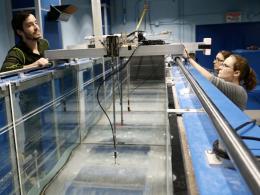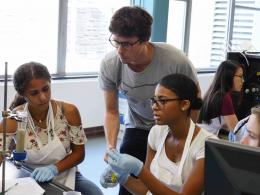
Environmental Engineering
Research in Environmental Engineering aims, in part, to obtain an improved understanding of physical, chemical and biological processes occurring in the natural and built environment.
In parallel, a systems-based approach explores the interplay of several such processes across different scales in terms of their impact on larger-scale natural resources and urban infrastructure. Intimately linked to this exploration is establishing the appreciation for associated societal impacts and their on influence relevant management strategies and policy. Under the overarching focus on the sustainable, such a combined process-systems-based approach enables a path to action to protect and preserve ecosystem equilibrium, urban quality of life, human health and air/water quality. Additionally, resilience in a changing climate is promoted and a progressive shift to renewable energy sources is enabled.

Environmental and Water Resources Systems
Courses and research consider the integration and analysis of systems engineering and of economic policy issues posed by the need to manage water, land, air, and human resources, as well as environmental remediation efforts.

Environmental Fluid Mechanics & Hydrology
Current research topics include breaking waves and nearshore processes; wave-structure interactions; tsunamis; air-sea exchange processes; the transport and fate of contaminants in the nearshore environment; lake mixing; transport and circulation; measurement technologies; hydrologic phenomena, such as land surface processes, earth-atmosphere interactions, infiltration, and groundwater.

Environmental Processes
The Environmental Processes faculty focus on advancing fundamental knowledge and developing sustainable technologies that can contribute to the paradigm shifts needed to face the most urgent environmental challenges facing human societies such as energy/resources crises and climate change.
The Helbling Research Group
Aquatic science and technology in the Helbling Research Group: How we achieve water quality monitoring and remediation in a novel way.
Everyday human activities release chemicals into the environment. To understand and address these impacts, we study these chemicals, where they go and how we can treat them to keep our environment clean and our drinking water safe. This video was created by the Helbling Research Group. Produced by Ph.D. students Vicky Wu, Casey Ching, Corey Carpenter, Paige Jacob, and Marika Nell. Music by Nat Jenkins.

